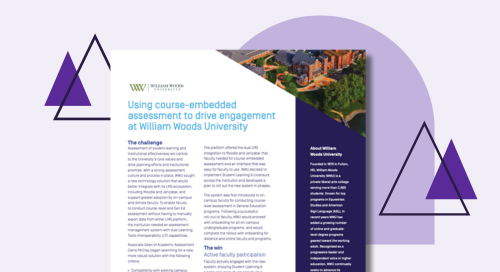Assessment of student learning and institutional effectiveness are central to the University’s core values and drive planning efforts and institutional priorities. With a strong assessment culture and process in place, WWU sought a new technology solution that would better integrate with its LMS ecosystem, including Moodle and Jenzabar, and support greater adoption by on-campus and remote faculty. To enable faculty to conduct course-level and Gen Ed assessment without having to manually export data from either LMS platform, the institution needed an assessment management system with dual Learning Tools Interoperability (LTI) capabilities.
Associate Dean of Academic Assessment Carrie McCray began searching for a new, more robust solution with the following criteria:



Associate Dean McCray rigorously evaluated several products and decided to adopt Student Learning & Licensure (formerly known as Via).
The platform offered the dual LMS integration to Moodle and Jenzabar that faculty needed for course-embedded assessment and an interface that was easy for faculty to use. WWU decided to implement Student Learning & Licensure across the institution and developed a plan to roll out the new system in phases.
The system was first introduced to on campus faculty for conducting course level assessment in General Education programs. Following a successful roll-out to faculty, WWU would proceed with onboarding for all on-campus undergraduate programs, and would complete the rollout with onboarding for distance and online faculty and programs.
Faculty actively engaged with the new system, enjoying Student Learning & Licensure’s ease of use and intuitive navigation. They especially appreciated the ability to funnel student work directly through Moodle and Jenzabar, which eliminated the need to constantly switch between systems and duplicate efforts.
“Faculty like the ability to streamline their grading and assessment efforts,” said McCray. “Honestly, Student Learning & Licensure is just ridiculously easy to use.”
Throughout the Equestrian Studies program and in courses within the ASL program, faculty found Student Learning & Licensure’s support for video embedded assessment to be a gamechanger. Students could easily share portfolios showcasing their field experience, more effectively track their own performance over time, and receive real-time feedback. Faculty also found it easy to create and customize signature activities for required Gen Ed assessments, and they liked Student Learning & Licensure’s built in reporting that helped them analyze student learning outcomes.
Within a year following implementation, WWU had systematically conducted course-level assessment in all 52 of its on-campus undergraduate programs, providing the Assessment Committee and Academic Council with a breadth of data that had been nearly impossible to collect in the previous system due to low faculty participation. Even nonacademic departments found it easy to use the system to analyze and report on meaningful student outcomes data. With full participation of programs, WWU was able to more effectively document evidence of student learning and evaluate outcomes achievement campus-wide. Active faculty involvement reinforced WWU’s strong culture of assessment, and the solid foundation established for course-level assessment paved the way for broader assessment initiatives, including program-level assessment.
In the coming year, William Woods plans to better align course-based outcomes with program objectives and use Student Learning & Licensure to inform program improvements. As participation in online and field-based programs grows, the institution expects increased demand from students for support creating and cultivating showcase portfolios for internship and job applications. Using the fully implemented strategies in the Equestrian Studies program and the emerging work in the ASL program as models, WWU is eager to scale these high-impact portfolio practices and continue delivering on its mission to provide students with innovative learning experiences beyond the traditional classroom.

See how our tools are helping clients right now, get in-depth information on topics that matter, and stay up-to-date on trends in higher ed.